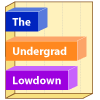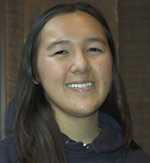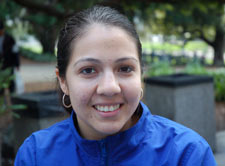UC Berkeley Press Release

|
The undergrad lowdown
Latest
surveys offer a 360-degree view of UC Berkeley's
student body
BERKELEY — Think "Cal student" and what's the first image that comes to mind? Whatever your conception, or misconception — by political persuasion, ethnicity, attire, major, or grooming habits — there's no need to think inside the quadrangle when a mountain of data can set stereotypes to rest. Each spring at Berkeley, and every other spring at all nine UC campuses with undergraduate students, thousands of freshmen, sophomores, juniors, and seniors answer an extensive web-based questionnaire known as the UC Undergraduate Experience Survey (UCUES). And, after crunching the numbers, UC Berkeley's Office of Student Research (OSR) posts the Berkeley campus results online for all to view and digest.
The latest UCUES results are in. Motivated by the chance to win cash, iPods, and other prizes (and did we mention their civic mindedness?), 11,957 out of 23,278 spring-semester Berkeley undergrads (51%) answered the survey's detailed queries on wide-ranging matters — from classroom experiences to jobs and money, career aspirations, math and foreign-language skills, political leanings, social attitudes, and how they get their news.
Starting today and in four stories to be published on succeeding days, we'll call out noteworthy UCUES 2007 findings. And while we're on the subject, we'll round out the picture with a few noteworthy findings from admissions data and recently-completed OSR surveys of new freshmen and transfer students, and of students' high-tech ownership and use.
Family affairs
 Five-part series: Five-part series: A 360-degree view of a student body • Roots
& Identity: Family background, keeping in touch with home,
campus personas • The
ABCs of UCUES: How the survey is conducted |
The "studious class…. are thin and pale, their feet are cold, their heads are hot, the night is without sleep…" the American writer Ralph Waldo Emerson once said. An apt description, perhaps, of some of Berkeley's bookish. But to get a more conventional picture of students' "class" backgrounds, UCUES asks about family resources. Just over 20% of Berkeley undergrads report their parents' combined gross annual income is less than $35,000. On the opposite end of the scale, 41% say their parents make six figures or above, and 10% more than $200,000 a year.
Do these students have a college-going tradition in their families? Campus surveys have shown that at least since the early 1990s, a quarter or more of Berkeley undergrads have been the first in their families to attend college. In 2007, as in 2006, first-generation college students make up about 30% of fall freshmen entrants. For fall semester 2007, women make up 54% of Berkeley undergrads, continuing a female majority that has been in place for about a decade. By ethnicity, undergraduates are 42% Asian, 31% white, 12% Hispanic, 3% African American, 1.5% other, 0.5% Native American.International students account for 3% of Berkeley undergrads; another 7% provide no ethnic data. In the 2007 surveys of new freshman and transfer students, more than one in eight say they're multi-racial or multi-ethnic. (For a 2005 look at such students, see "Mixed emotions: The multiracial student experience at UC Berkeley.")
 Close to 73% of Berkeley undergrads were born in
the United States, while more than a quarter
(27%) are foreign born or foreign nationals.
Forty percent are second-generation immigrants (with
one or both parents born outside the U.S). This is
similar to the state's population, which is 27% first-generation
and 21% second-generation (among 18 to 24 year olds,
the percentages are probably a bit higher). Twenty-three
percent are fourth-generation immigrants, having
four U.S.-born grandparents.
Close to 73% of Berkeley undergrads were born in
the United States, while more than a quarter
(27%) are foreign born or foreign nationals.
Forty percent are second-generation immigrants (with
one or both parents born outside the U.S). This is
similar to the state's population, which is 27% first-generation
and 21% second-generation (among 18 to 24 year olds,
the percentages are probably a bit higher). Twenty-three
percent are fourth-generation immigrants, having
four U.S.-born grandparents.
For nearly 2 in 5, English is a second language. Languages spoken at home number at least 70 — from Armenian and Catalan to Mandarin, Navajo, and Yoruba.
Connecting with home
How do Berkeley undergrads stay connected with their parents? The 2007 UCUES reports that 24% talk to their parents daily by telephone, while 81% speak with their parents by phone once a week or more. E-mail is the next most common way of staying in touch — with 32% e-mailing their folks at least once a week. Meanwhile, 15% say they visit in person with their parents once a week or more, while 13% text message at least weekly.
 'We
text message through cell phone at least every
two or three days, much more than even
e-mail. While my wife talks to Catherine
by the phone.' 'We
text message through cell phone at least every
two or three days, much more than even
e-mail. While my wife talks to Catherine
by the phone.'— Cal Parent Michael Jedlicka |
 'I
call my parents like every other day or so. At
the beginning I started e-mailing, but my parents
aren't technology oriented.' 'I
call my parents like every other day or so. At
the beginning I started e-mailing, but my parents
aren't technology oriented.'
— Nicholas Manginelli, freshman |
What do these undergrads feel about their parents' level of involvement in their lives at college? It turns out that they're twice as likely to say they'd prefer their parents to be more, rather than less, involved. Three-quarters, however, think their parents' level of involvement in their business is just right.
Motivations, goals, and college IDs
 'I initially came here thinking I was going to med school. But I’ve totally changed my mind: now I’m going into business and mass comm. So that’s very different, a very big swap.... I'm planning to either get my MBA or a law degree.' — Catherine
Jedlicka, sophomore |
College students have the chance on campus to shed childhood and high-school identities and don new personas, if they choose. Asked to select the "college identities" that best describe themselves (they could choose more than one), 42% of UC Berkeley students say they identify strongly with their major or field of interest — thinking of themselves first, say, as an art practice or an engineering student. Their next most popular IDs are "a student who is serious about getting good grades" (34%), by racial or ethnic background (27%), and "liberal" (26%). Also among us are self-identified slackers (12%), partiers (12%), the artsy (14%), and the athletes/jocks (8%).
Why attend college? "To discover what kind of person I really want to be" is a "very important" college goal for 83% of UC Berkeley undergrads, followed by "obtain the skills I need to pursue my chosen career" (82%), "acquire a well-rounded general education (76%), and "establish meaningful friendships" (75%). For 63%, developing a personal code of values and ethics is very important.
Talented and ambitious on the whole, most Berkeley students view their bachelor's degree as a stepping stone to further education. UCUES found that 79% plan to earn a graduate degree, including 25% who plan to obtain a Ph.D. or other doctoral degree (not including MDs). Only 6% plan to finish with "only" a bachelor's degree; another 15% are undecided.
 'I like comparative politics — comparison of countries, studying their history and how that affects their political systems.... I don’t plan to do anything with poli sci, actually. I want to teach math.' — Ana
Mejia, junior |
As for where Cal undergrads imagine landing at the end of their education, medicine and health-related professions are the most popular future careers (for 19%), followed by business and finance-related professions (15%), and engineering and computer programming (11%). One out of ten frankly selected "I have no idea whatsoever."
Next: School and play — Academic experiences, time and technology use

